Biography
Early life
In the early 1960s, Zanotelli moved to Cincinnati, Ohio to attend a course on theology while he was in high school. In 1964, after completing his theological studies in Cincinnati, he was ordained a priest.
Sudan and the Nuba
As a Combonian missionary, he left for South Sudan, which was plagued by civil war and where he stayed for eight years. The local government eventually pressured him to leave because of his open Christian witness and the active solidarity he showed the Nuba people. The reasons cited by the government included Zanotelli's inclusion of African traditional ceremonials in mass celebrations. Vatican authorities also objected to this practice, although Zanotelli received permission from local Catholic bishops. This annoyed both the local Sudanese authorities (which feared a dangerous mixture between a foreign religion and the local rites and ceremonies of a downcast people), and senior prelates in Rome who were finding it hard to accept the reforms brought on by the Second Vatican Council.
His sermons denounced injustices while exposing the responsibilities of corrupt government and administration officials who filled their pockets with both international and local aid funds.
Director of Nigrizia magazine in Verona
The house of the Combonians in Verona was a quiet place of gathering for most of the senior priests coming home from the mission fields, but it also hosted a printing company, publishing two different magazines: The little missionary and Nigrizia, a magazine providing news about the various missions around the world and was first published back in 1883. In 1978 Zanotelli became director of Nigrizia and worked to make it more of an information monthly, with the goal to be summed up in his statement: "To be at Africa's service, specifically the voice of those who have no voice" to radically criticize the political-economical system of the north of the world and the way it produces more and more misery in the south, destroying the most beautiful, significant, authentical African values."
Over the next decade, in his magazine Zanotelli took more specific stands on weapons dealing, on the cooperation for development having turned into an entangled business, on South African apartheid. All these matters had been taken on steadfastly and systematically, with the collaboration of the missionaries present on the different fields.
In 1987, some political and Vatican leaders urged him to leave the direction of Nigrizia. He was practically fired. At that time Zanotelli faced continuous attacks, but the goal was to undermine the growth and diffusion of the recently born movement he had inspired.
He denounced publicly the senior Italian political leadership of the time, including Giulio Andreotti, Giovanni Spadolini, Bettino Craxi and Flaminio Piccoli. He actually anticipated the Tangentopoli season. In January 1985 he published in the magazine an editorial titled "The Italian face of African famine", an open and cutting exposure of the system around Third World aid. He commented that Tangentopoli could be exposed then, they had all the clues. From African famine he passed on to the arms trade and environmental problems, and exposed what he regarded as the entanglement between the political class and business. Spadolini on the Espresso magazine, attacked heavily the so-called red priests, to the point of accusing him of incitement to political delinquency and international terrorism.
The period 1985-87 resulted in a hard time, with part of the Vatican hierarchy and of the "old missionaries" trying to bend him or expel him. Zanotelli described it as "a time of great personal suffering" which led him to a spiritual crisis and to doubting: "Am I really sure I told the truth? Can it be possible 50 million Italians are unable to see these scandals?" His cultural heritage has passed on to the following directors and editors of the magazine, and still keeps Nigrizia alive.
Korogocho, or Hell on earth
In the local language the name Korogocho means confusion, chaos. Zanotelli stayed in Korogocho, one of the many shantytowns surrounding Nairobi, (Kenya), until 2001. He founded many small Christian communities and a workers' cooperative for recycling, which employed many of the inhabitants of the shanties; he urged and helped in the Udada project, a community of former prostitutes involved in helping the women who wanted to change their life and at the same time he was working and struggling for the reforms about land distribution, one of the turning points in Kenyan politics.
In Korogocho human degradation was frightful and Zanotelli's assumption "Maybe God is sick" became the title of a book on Africa, written by Walter Veltroni, former secretary of the Italian DS party (Democratici di Sinistra, Democrats of the Left), former mayor of Rome and the only political leader (besides the American pastor and activist Jesse Jackson) who ever visited the place. In Korogocho God's sicknesses are named AIDS, hunger, prostitution, drugs, alcoholism, violence.
The Lilliput Net
During a sabbatical year Zanotelli spent in Italy in 1995-96, Zanotelli laid the foundation of the Lilliput Net project, inspired by the structure of the internet. The project is the result of meetings with Catholic associations, as well as inspiration from Jeremy Brecher and Tim Costello, as outlined in their book Global village or global pillage - Economic reconstruction from the bottom up.
In Italy, Zanotelli became a point of reference for the new global movement and the Lilliput Net. He took part in the organization and management of the European Social forum in Florence, 6-10 November 2002. This forum confirmed the supremacy of the non-violent policy of the movement on a relatively small minority which (after the violence exploded during the Genoa G8 meeting in July 2001) was tempted to stand for a more violent manifestation of dissent.

Pope John Paul I was head of the Catholic Church and sovereign of the Vatican City from 26 August 1978 until his death 33 days later. His reign is among the shortest in papal history, resulting in the most recent year of three popes and the first to occur since 1605. John Paul I remains the most recent Italian-born pope, the last in a succession of such popes that started with Clement VII in 1523.
The relations between the Catholic Church and the state have been constantly evolving with various forms of government, some of them controversial in retrospect. In its history, the Church has had to deal with various concepts and systems of governance, from the Roman Empire to the medieval divine right of kings, from nineteenth- and twentieth-century concepts of democracy and pluralism to the appearance of left- and right-wing dictatorial regimes. The Second Vatican Council's decree Dignitatis humanae stated that religious freedom is a civil right that should be recognized in constitutional law.
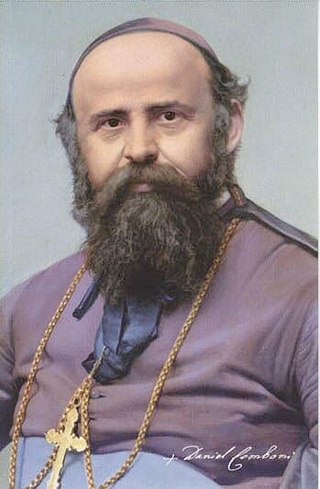
Daniele Comboni was an Italian Catholic bishop who served in the missions in Africa and was the founder of both the Comboni Missionaries of the Heart of Jesus and the Comboni Missionary Sisters. Comboni studied under Nicola Mazza in Verona where he became a multi-linguist and in 1849 vowed to join the missions in the African continent although this did not occur until 1857 when he travelled to Sudan. He continued to travel back and forth from his assignment to his native land in order to found his congregations and attend to other matters, and returned in 1870 for the First Vatican Council in Rome until its premature closing due to conflict.
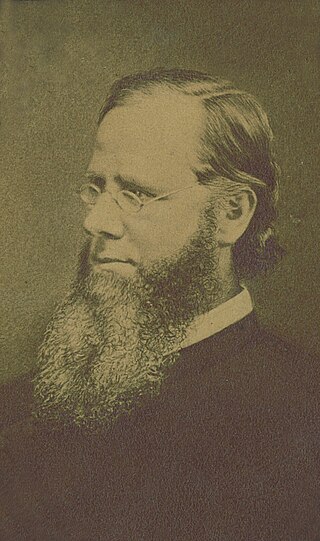
Isaac Thomas Hecker was an American Catholic priest and founder of the Paulist Fathers, a North American religious society of men.

The Redemptorists officially named the Congregation of the Most Holy Redeemer, abbreviated CSsR, is a Catholic clerical religious congregation of pontifical right for men. It was founded by Alphonsus Liguori at Scala, Italy, for the purpose of labouring among the neglected country people around Naples. It is dedicated to missionary work and they minister in more than 100 countries. Members of the congregation are Catholic priests and consecrated religious brothers.

Pope Francis is the head of the Catholic Church, the bishop of Rome and sovereign of the Vatican City State. Francis is the first pope to be a member of the Society of Jesus (Jesuits), the first from the Americas, the first from the Southern Hemisphere, and the first pope from outside Europe since the 8th century papacy of Syrian pope Gregory III.
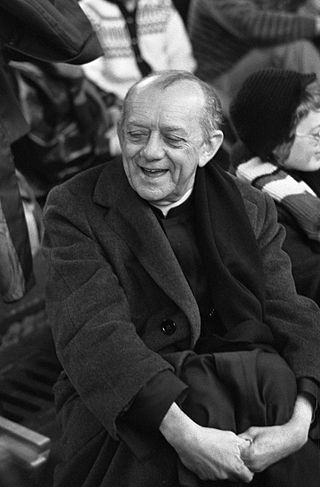
Hélder Pessoa Câmara was a Brazilian Catholic archbishop. A self-identified socialist, he was the Archbishop of Olinda and Recife, serving from 1964 to 1985, during the military dictatorship in Brazil. He was declared a Servant of God in 2015.
Walter Joseph Ciszek, S.J. was a Polish-American Jesuit priest of the Russian Greek Catholic Church who conducted clandestine missionary work in the Soviet Union between 1939 and 1963.
A society of apostolic life is a group of men or women within the Catholic Church who have come together for a specific purpose and live fraternally. It is regarded as a form of consecrated life.
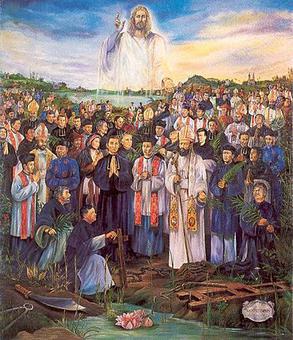
Vietnamese Martyrs or Saint Andrew Dung-Lac and Companions, also known as the Martyrs of Annam, Martyrs of Tonkin and Cochinchina, Martyrs of Indochina, are saints on the General Roman Calendar who were canonized by Pope John Paul II. On June 19, 1988, thousands of Overseas Vietnamese worldwide gathered at the Vatican for the Celebration of the Canonization of 117 Vietnamese Martyrs, an event chaired by Monsignor Tran Van Hoai. Their memorial is on November 24.
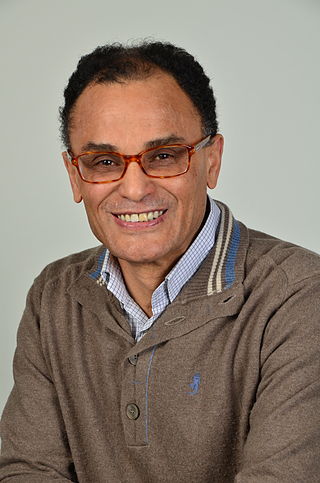
Magdi Cristiano Allam, is an Egyptian-Italian journalist and politician, noted for his criticism of Islam and his articles on the relations between Western culture and the Islamic world.
Maximum illud is an apostolic letter issued by Pope Benedict XV on 30 November 1919. As is traditional with such documents, it takes its title from the opening words of the original Latin text, meaning "that momentous". Benedict begins by recalling "that momentous and holy charge" found in Mark 16:15: "Go into the whole world and preach the gospel to all creation."

Korogocho is one of the largest slum neighbourhoods of Nairobi, Kenya. Home to 150,000 to 200,000 people pressed into 1.5 square kilometres, northeast of the city centre, Korogocho was founded as a shanty town on the then outskirts of the city.
The Roman Catholic Church in the 20th century had to respond to the challenge of increasing secularization of Western society and persecution resulting from great social unrest and revolutions in several countries. It instituted many reforms, particularly in the 1970s under the Vatican II Council, in order to modernize practices and positions. In this period, Catholic missionaries in the Far East worked to improve education and health care, while evangelizing peoples and attracting numerous followers in China, Taiwan, Korea, and Japan.
Paolo Manna was an Italian Roman Catholic priest and a member from the Pontifical Institute for Foreign Missions as well as the founder of the Pontifical Missionary Union. Manna worked in the missions in Burma and even served as the Superior General for PIME. Manna did much in his life to promote the missions and the evangelic and apostolic zeal that accompanied it and he established newspapers and movements to help promote this charismatic apostolate. He also held several leadership positions in PIME and used that standing in order to further engage with prospective missionaries.

Menghesteab Tesfamariam, M.C.C.I. is an Eritrean prelate of the Eritrean Catholic Church who has been the metropolitan archbishop of the Archeparchy of Asmara and head of the Eritrean Catholic Church since 2015. He has been a bishop since 2001.

The Martyrs of Laos are seventeen Catholic priests and professed religious as well as one lay young man venerated as martyrs killed in Laos between 1954 and 1970 of the First and Second Indochina Wars during a period of anti-religious sentiment under the Pathet Lao Theravada Buddhist-communist political movement.

The Martyrs of Albania were a collective group of 38 individuals killed during the Communist regime in Albania from 1945 until 1974. All were born at various times between 1874 and 1935; the group included Albanians and Italians as well as one German. Each of these individuals, apart from four, were part of the religious life as either priests or religious and served as either missionaries or educators with a great deal spending their educational formation in Italian and Austrian cities.

Romeo Panciroli was an Italian prelate of the Catholic Church who worked in communications until 1984 and then in the diplomatic service of the Holy See.

Pedro Ortiz de Zárate was an Argentine Roman Catholic priest and Giovanni Antonio Solinas was an Italian Roman Catholic priest and a professed member of the Society of Jesus. Zárate served in a local municipal role before he was married and had two children. He was widowed and decided to enter the priesthood once his two sons were old enough to handle the change; he was a noted preacher and envisioned himself as one that would convert and preach amongst the local Argentine native tribes. Solinas left for the Argentine missions alongside three companions and moved from place to place before he settled in the Salta province. Both priests were slain after two tribes of natives decided to deceive them to preach and work in their village before ambushing and killing both priests; eighteen others were slain alongside them and their bodies left to be discovered as the assailants fled in fear of Spanish forces that were not too far from their position.















